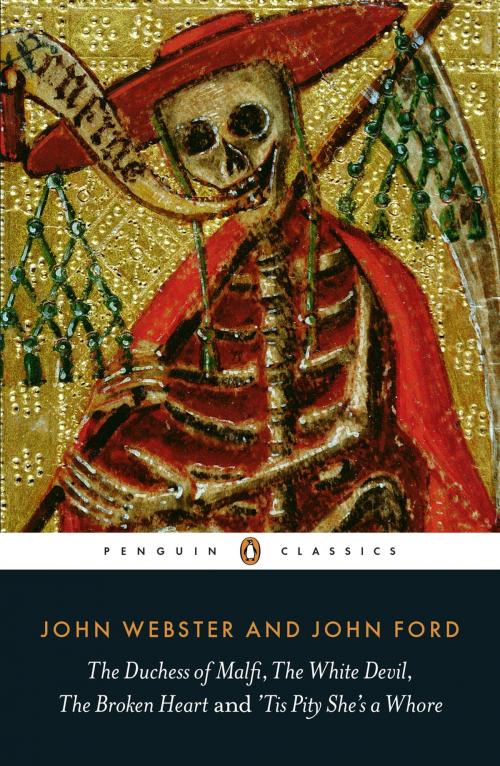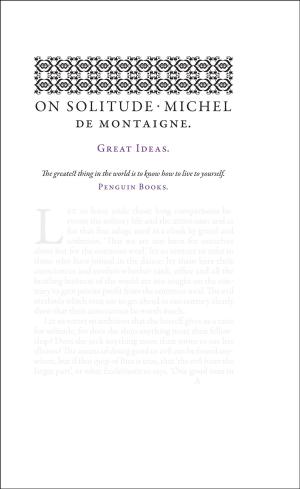The Duchess of Malfi, The White Devil, The Broken Heart and 'Tis Pity She's a Whore
with The White Devil, The Broken Heart and 'Tis Pity She's a Whore
Fiction & Literature, Drama, British & Irish, Nonfiction, Entertainment| Author: | John Webster, John Webster, John Ford | ISBN: | 9780141392240 |
| Publisher: | Penguin Books Ltd | Publication: | August 7, 2014 |
| Imprint: | Penguin | Language: | English |
| Author: | John Webster, John Webster, John Ford |
| ISBN: | 9780141392240 |
| Publisher: | Penguin Books Ltd |
| Publication: | August 7, 2014 |
| Imprint: | Penguin |
| Language: | English |
These four plays, written during the reigns of James I and Charles I, took revenge tragedy in dark and ambiguous new directions. In The Duchess of Malfi and The White Devil, John Webster explores the role of women and the problems of power, sex and corruption in the Italian court, creating two unforgettable anti-heroines. In The Broken Heart, John Ford questions the value of emotional repression as his characters attempt to subdue their desires and hatreds in ancient Greece. Finally, Ford's masterpiece 'Tis Pity She's a Whore explores the taboo theme of incest and forbidden lust in a daring reworking of Romeo and Juliet.
Jane Kingsley-Smith has edited the plays from the earliest quartos and added invaluable editorial material, including explanatory glosses and a new introduction that discusses how the playwrights explored issues around women, sex, power and violence.
JOHN WEBSTER was born in about 1578 in London. He studied law at the Middle Temple before embarking on a career in the theatre, collaborating on many plays with contemporary dramatists. But it was his two solo-authored tragedies, The White Devil (1612) and The Duchess of Malfi (1614), which sealed his reputation. He died in the 1630s.
JOHN FORD was born in 1586 in Devon. His early career was wholly concerned with poetry and philosophical works, and it was not until the 1620s that he began collaborating on stage plays. In the late 1620s, he began writing alone, producing the eight plays on which his reputation would be based, including The Broken Heart (1620) and 'Tis Pity She's a Whore (c.1630). Nothing more is known of Ford after the performance of his last play in 1638.
JANE KINGSLEY-SMITH completed her PhD at the Shakespeare Institute, Stratford-upon-Avon and is the author of two monographs: Shakespeare's Drama of Exile (2003) and Cupid in Early Modern Literature and Culture (2010). She is a Reader at Roehampton University, London, and a regular guest speaker at Shakespeare's Globe.
These four plays, written during the reigns of James I and Charles I, took revenge tragedy in dark and ambiguous new directions. In The Duchess of Malfi and The White Devil, John Webster explores the role of women and the problems of power, sex and corruption in the Italian court, creating two unforgettable anti-heroines. In The Broken Heart, John Ford questions the value of emotional repression as his characters attempt to subdue their desires and hatreds in ancient Greece. Finally, Ford's masterpiece 'Tis Pity She's a Whore explores the taboo theme of incest and forbidden lust in a daring reworking of Romeo and Juliet.
Jane Kingsley-Smith has edited the plays from the earliest quartos and added invaluable editorial material, including explanatory glosses and a new introduction that discusses how the playwrights explored issues around women, sex, power and violence.
JOHN WEBSTER was born in about 1578 in London. He studied law at the Middle Temple before embarking on a career in the theatre, collaborating on many plays with contemporary dramatists. But it was his two solo-authored tragedies, The White Devil (1612) and The Duchess of Malfi (1614), which sealed his reputation. He died in the 1630s.
JOHN FORD was born in 1586 in Devon. His early career was wholly concerned with poetry and philosophical works, and it was not until the 1620s that he began collaborating on stage plays. In the late 1620s, he began writing alone, producing the eight plays on which his reputation would be based, including The Broken Heart (1620) and 'Tis Pity She's a Whore (c.1630). Nothing more is known of Ford after the performance of his last play in 1638.
JANE KINGSLEY-SMITH completed her PhD at the Shakespeare Institute, Stratford-upon-Avon and is the author of two monographs: Shakespeare's Drama of Exile (2003) and Cupid in Early Modern Literature and Culture (2010). She is a Reader at Roehampton University, London, and a regular guest speaker at Shakespeare's Globe.















